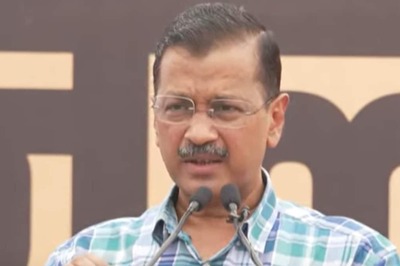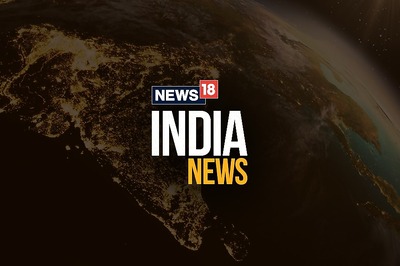
views
New Delhi: The ceasefire announced by the Home Minister Rajnath Singh on Wednesday was welcomed immediately by Jammu and Kashmir Chief Minister Mehbooba Mufti, minutes after the official announcement was made from the ministry.
Expressing her happiness with Home Minister’s decision, Mufti tweeted - in English, Hindi and Urdu - her “wholehearted welcome” adding that “such a decision will go a long way in creating a peaceful and amicable environment for a sustained dialogue.”
The reasons given by the Union Home Minister for announcing the ceasefire - “it is important to isolate the forces that bring a bad name to Islam by resorting to mindless violence” - and the welcome message of Mehbooba Mufti, indicate that the Centre and the state are looking to initiate a round of political engagement in the Valley.
Mehbooba’s tweet that the ceasefire will help set up an atmosphere for “sustained dialogue” also suggests that the Centre either wants to provide a better atmosphere for its interlocutor Dineshwar Sharma or start a fresh round of dialogue in Kashmir through some other representatives - former bureaucrats or serving politicians - who still enjoy goodwill in the Valley.
But most immediately, the announcement of the ceasefire helps lay a welcome mat for Prime Minister Narendra Modi’s visit scheduled on May 19. His two-day visit, to inaugurate the 330 MW Kishenganga hydroelectric project in North Kashmir’s Budgam district, and to commemorate the 100th anniversary of Ladakhi spiritual leader Kushak Bakula, will be the first in this year which has already seen 135 deaths, 63 of whom were civilians and security forces.
The ceasefire will allow the Prime Minister to make a bold statement and announce a peace process that BJP’s alliance partner PDP has been asking for a long time.
It will also give Mehbooba, whose party has been almost marginalised in the Valley, some brownie points and help her political workers reach out to the public. Political workers from PDP and other parties have been repeatedly targeted and killed (the latest such murder happened on April 25th) in the Valley. For the last one year, several political leaders have not even visited their constituencies.
Getting people to vote in the upcoming general elections will be the toughest task for political parties in Kashmir. Farooq Abdullah recently criticised the government for “surrendering before Hurriyat and other anti-democratic forces” by cancelling the Parliamentary bypoll in Anantnag, which he claimed was the first instance of its kind in the Valley since 1996.
The National Conference patriarch himself participated in a recent Parliamentary bypoll in Srinagar, in which only 7.4% votes were polled - the lowest in last two decades.
Junaid Mattu, spokesperson NC, when reached by News18 said his party welcomed the ceasefire. He also called for a dialogue not just with people in Kashmir, but between India and Pakistan as well.
“We welcome this and hope for a long-term reconciliatory approach. While nobody is asking the forces to go easy on militants, an initiative to take some concrete political steps is also required urgently. Singular approach towards just eliminating militants won’t help,” Mattu said. When asked to elaborate on his idea of “concrete steps”, he replied, “open minded talks with Pakistan and Hurriyat are required.”
Many in the Valley described the announcement of the ceasefire as “abrupt”, considering that no BJP leader had warmed to the idea of ceasefire when it was proposed by Mufti last week.
In fact, many had assumed that the government was not in favour of ceasefire, based on the statements of the Army Chief and the Defence Minister.
Taking an aggressive stance towards the ongoing unrest in Kashmir, the Army Chief had recently, in an interview, said, “Azadi isn’t going to happen...we will fight those who seek Azaadi.”
Defence Minister Nirmala Sitharaman had talked about dealing with terrorism with “a firm hand” and claimed that the forces will continue to undertake “action every minute”.
Gowhar Geelani, a senior journalist based in the Valley, said that the ceasefire will give the government “something to sell” in Kashmir. “But it only will have some symbolic value. If the government doesn’t talk to the Hurriyat and Pakistan, this ceasefire will mean nothing.”
According to data available with South Asia Terrorism Portal, around 760 people have died in J&K since 2016 - the year Hizbul Mujahideen commander Burhan Wani was killed in an encounter.
Though some of these fatalities have occurred in border areas and some have been reported from Jammu, but most of these deaths have happened in encounters in Kashmir. The recruitment of local boys among the terror groups has increased. One person is picking up gun every third day suggesting that only military engagement may not work in Kashmir.
Though security forces have a different point of view. According to officers posted in the Valley, highest number of militants - 218 – killed in the last decade was in 2017. And the fact that many of them like Saddam Padder, who was recently killed in an encounter in the Valley earlier this month, were some of the most wanted men in the Valley, has lead the forces to believe that the ceasefire may not have been announced at the most opportune moment.
“Yes we do believe that we have the upper hand in this conflict right now. Our intelligence networks, both human and technical, has vastly improved, and we are getting pinpoint intelligence about the movement of the militants. Our strike rate against them has also improved, so it was only logical that we maintained the pressure on them and pushed them to surrender,” said an army officer who did not wish to be quoted.
He added, “We have seen ceasefire earlier also. In 2000, for instance when the then PM Vajpayee announced it. The thing is that these announcements seem to apply only to us. It is our experience that the militants continue to target us as and when they find an opportunity. So while we will not carry as many cordon and search operations, we will continue to hit them when we get pinpoint intel.”
The early few days, including those when the Prime Minister will visit, will test the efficacy of this ceasefire. If mistrust between various agencies and the people dissolves, Wednesday’s announcement by the Home Minister could give everyone in Kashmir a much-needed break from the constant cycles of violence and start the healing process for electoral politics in the Valley.




















Comments
0 comment